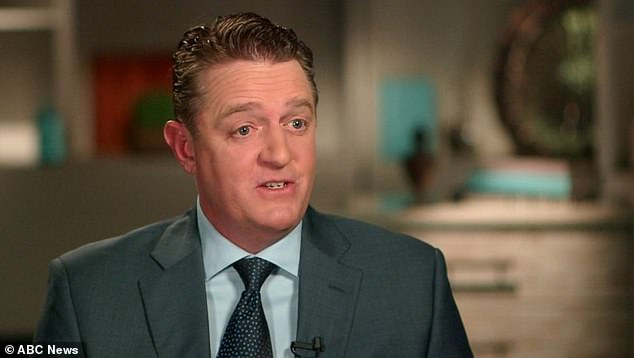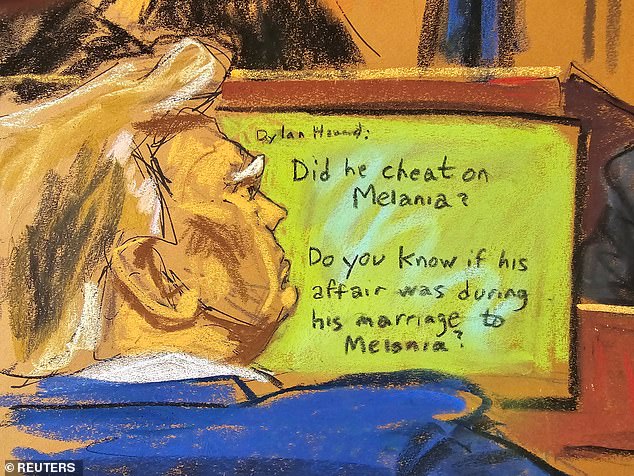How prosecutors use evidence from Trump’s ‘penny-pinching’ to prove the billionaire tried to cover up the payout to Stormy Daniels
It was October 18, 2016, less than a month before Election Day, and famed billionaire presidential candidate Donald Trump had a major “s*** show” under his belt.
A porn star who says she once playfully hit him on the backside with a rolled-up magazine during a 2006 photo shoot has demanded a significant sum of money to silence her claims of a sexual affair.
The electorate might not like it. Melania might not like it either. Incredibly, a team of lawyers and advocates had come up with a way to make the problem go away.
It was all on a silver platter, as one party put it. But it almost blew up because the would-be billionaire was ‘tight’ with his money.
It was one of many times when the billionaire with expensive taste hated parting with his money but faced dire consequences.
The terms of the deal were brokered through a series of panicked texts and phone calls, often involving troubled former Trump fixer Michael Cohen.
The porn star who claimed she had sex with Trump in 2016 reportedly signed away her rights to the alleged connection for $130,000 just weeks before Election Day 2016.
Penny-wise: A deal to make good on Stormy Daniels’ allegations of a sexual affair with Trump nearly blew up weeks before Election Day in 2016 because Trump was “tight” on money, a lawyer for Daniels testified.
But then, on the 18th, Daniel’s lawyer Keith Davidson suddenly canceled the deal. The payment was unsuccessful.
He told National Enquirer editor Dylan Howard that it would be a “s*** show” and that Daniels would go public with her claims. That could be catastrophic for Trump’s presidential campaign, which was in its final weeks.
“I just had a feeling it was going to be more than a flurry of activity. I had a feeling it was going to be a tornado,” he testified in court in Manhattan on Tuesday during the Trump trial.
It would be a ‘full on blitz’, Davidson texted.
‘I bet. All because Trump is tight,” Howard wrote back.
Davidson explained in court what he meant when prosecutors asked him about it.
“That Mr. Trump was frugal. They had this deal right there on a silver platter. It was there for the taking. The only reason it’s not closing is because there’s no financing. “The only reason funding wasn’t provided is because they didn’t want to spend the money,” he said.

Stormy Daniels’ former attorney, Keith Davidson, spoke about a critical period in October when Stormy Daniels’ payout fell apart and came back together. He testified that Trump’s “frugality” was the reason

Trump might have saved himself thousands of dollars if he had simply paid Daniels out of his own funds to suppress her claims of a sexual affair, which he denies
It’s one of the most curious questions of the whole Stormy Daniels issue. Why didn’t the would-be billionaire just pay the prosecutor himself? If he had, he might not be facing 34 counts of falsifying company records.
Instead, Cohen put up the money himself to “silence” rumors of affairs that did not concern him.
That followed a series of apologies made by Cohen for failing to come up with the money, in a strange arrangement that saw the longtime Trump fixer negotiating a deal for two people identified only by psudonyms identified.
“God damn it, I’ll just do it myself,” he finally told Davidson, the lawyer recalled.
Cohen wasn’t rolling in dough at that point. To finance it, he had to take out a home equity line of credit.
And if he were reimbursed through checks from the Trump Organization — listed as “legal fees” as a key part of the alleged forgery charges — he would demand an even larger refund to avoid having to pay an additional tax bill on the “income.” to get. ‘
So the ‘frugal’ Trump would actually have saved significant amounts of money if he had paid for it himself. It also could have spared him charges on 34 counts of falsifying company records, although it is unclear whether the payout would have to be disclosed as a campaign-related expense — another element of the case that landed Cohen in jail for campaign finance violations.
Trump has denied having the affair, shaking his head in court as prosecutor Josh Steinglass described the contours of the deal, including the “assumption” of where the money would come from.
The back-and-forth during the trial shows that prosecutors are trying to get the witness to talk about Trump’s avarice — his reputation for the gold-plated bathroom fixtures on his private plane and repeated boasts about his luxury golf and real estate empire.
“What about Trump’s sobriety is relevant,” Steinglass asked Davidson during questioning, a question the judge would not allow.
“It is my understanding that Mr. Trump was the beneficiary of this contract and that in the vast majority of cases the beneficiary of the contract is the one who finances it,” was his response.
Judge Juan Merchan allowed the leading question to be answered.
“To what have you attributed the lack of financing of this deal?” he asked again.
“Frugality,” Davidson replied.
All the talk about penny pinching is not frivolous. It is essential to the core case that prosecutors laid out on the first day of the trial. They’re trying to establish Trump’s reputation for cheapness — to argue that he tried to hide payments meant to boost his campaign.
“Now you will see evidence at trial that Donald Trump was a very frugal businessman,” prosecutor Matthew Colangelo said in his opening statement.
‘He believed in pinching pennies. He believed in keeping an eye on every dollar. He believed in negotiating every bill. It’s everywhere in all the books he’s written. He ran the Trump Organization with complete control.
“You will hear testimonials about his ruthless focus on the bottom line. But when it came time to pay Michael Cohen back for the catch-and-kill deal, you’ll notice he didn’t negotiate the price; he doubled it. And he doubled it so they could disguise it as income.”
Prosecutors will have plenty of time to further develop Trump’s reputation as the trial progresses. He earned a reputation for it stiff contractors during his career as a casino magnate. He counted on cheaper non-union labor for its construction projects, the AFL-CIO noted. Trump even has been indicted by some of the attorneys who represented him – including one who filed a lawsuit to collect $5,000 in legal fees (the case resulted in a settlement).
Trump even listed “controlling costs” as one of his principles in “Art of the Deal.” He said his father Fred Trump — whose estate was the subject of a Trump family lawsuit from relatives who claimed they had gone stiff — taught him never to pay a penny more than he should.
